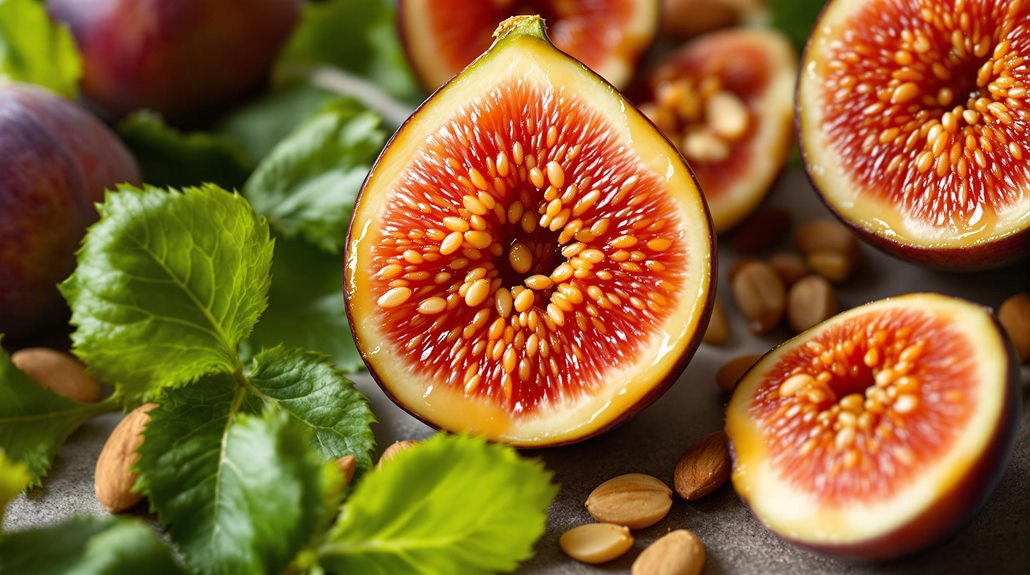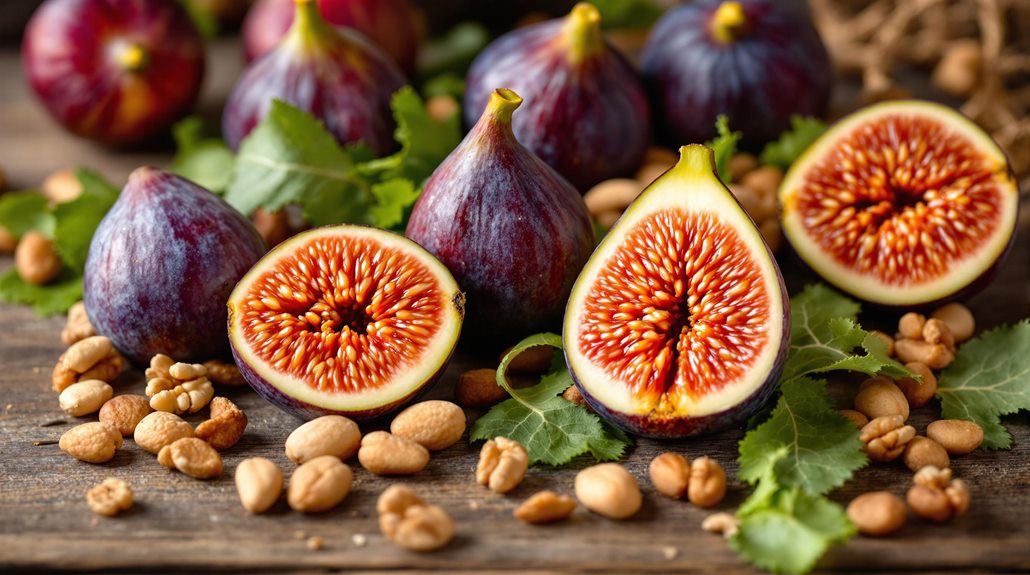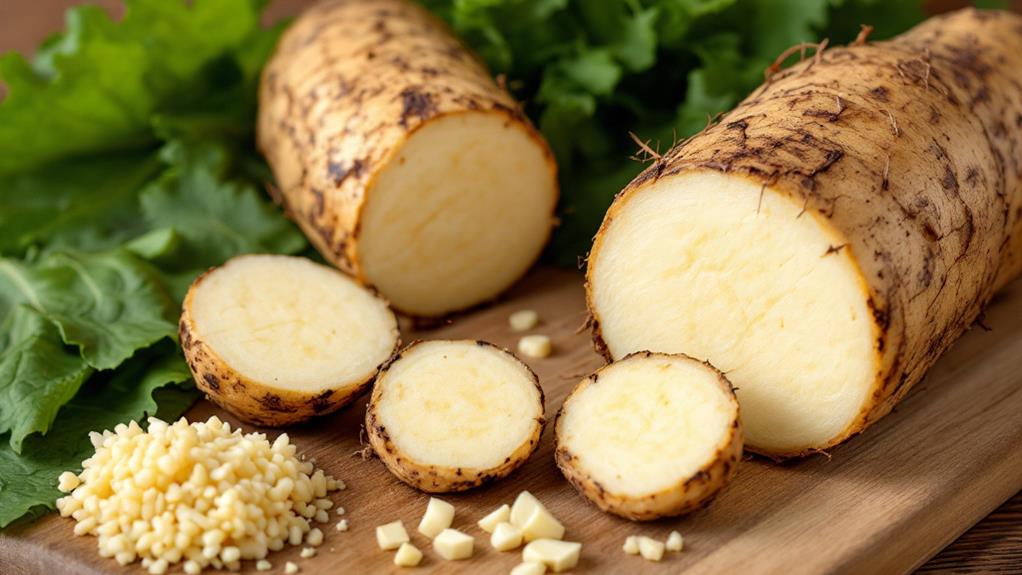Fig Nutrition and Health Benefits: A Superfood Guide

Figs pack a punch as a superfood with their low calories and significant nutrients. Fresh figs provide essential vitamins A, B, and K and about 93mg of potassium per fruit to support your heart. Their fiber content aids digestion, while antioxidants help fight oxidative stress. High levels of calcium and magnesium promote bone health. In the kitchen, figs shine in both sweet and savory dishes, from salads to desserts. To enjoy them at their best, choose ripe, plump figs and store them properly. A touch of moderation is key, as too many can upset your stomach. There's more to investigate.
Nutritional Profile of Figs
When considering the nutritional profile of figs, you'll find they pack a punch despite their small size. Fresh figs, for instance, are low in calories, with about 30 calories per 40-gram fruit. They mainly consist of carbohydrates and a notable amount of fiber—1 gram per fruit. This fiber content is important as it aids digestion and promotes gut health. In contrast, dried figs are more calorie-dense, offering around 103 calories per quarter cup, largely due to their higher sugar concentration from reduced water content.
Figs aren't just about fiber; they're also a fantastic source of fundamental minerals. With approximately 93 milligrams of potassium in a medium fresh fig, they help support heart health and maintain blood pressure. Calcium is another mineral found in figs, key for maintaining strong bones and teeth. Besides minerals, figs provide a range of vitamins, including A, B, and K, which contribute to general wellness and support numerous bodily functions.
Whether you choose fresh figs or dried figs, their impressive nutritional profile underscores why they're considered a superfood. By adding figs to your diet, you can enjoy their assorted health benefits and deliciously sweet flavor.
Health Benefits of Figs
Boasting a variety of health benefits, figs are a valuable supplement to any diet. They're packed with dietary fiber, which aids digestion and enhances gut health. One medium fresh fig provides about 1.45g of fiber, making it a smart choice for maintaining a healthy digestive system. Figs are also a great source of potassium, with approximately 160mg in an 80g serving, which plays an essential role in regulating blood pressure and supporting cardiovascular health.
The antioxidants present in figs, such as phenolic acids and flavonoids, help combat oxidative stress, potentially lowering the risk of chronic diseases like heart disease and diabetes. Moreover, figs contribute to bone health due to their high calcium and magnesium content, reducing the risk of osteoporosis.
| Nutrient | Health Benefit |
|---|---|
| Dietary Fiber | Aids digestion, gut health |
| Potassium | Regulates blood pressure, cardiovascular health |
| Antioxidants | Reduces oxidative stress, chronic diseases risk |
In addition, figs have been linked to improved menstrual health. Dried figs may alleviate symptoms of primary dysmenorrhea, offering relief from pain and menstrual distress. Incorporating figs into your diet could be a simple yet effective way to support overall well-being and wellness.
Culinary Uses of Figs

Figs offer a flexible range of culinary uses, enhancing both sweet and savory dishes with their unique flavor and texture. Fresh figs can raise your salads and sandwiches, while also serving as a delightful snack on their own. Their adaptability in culinary applications makes them an exciting ingredient in baked goods, lending natural sweetness to cakes and muffins. You can also pair fresh figs with savory components like prosciutto and cheese for gourmet appetizers that impress at any gathering.
Dried figs, on the other hand, are a nutritious supplement to your breakfast or snack routine. Toss them into oatmeal or yogurt, or mix them into trail mixes for a chewy texture and concentrated sweetness. These figs provide not only flavor but also numerous health benefits, making them a smart choice for a wholesome diet.
For a creative twist, try pureeing figs into sauces or spreads. This culinary application brings rich flavor to diverse dishes and acts as a natural sweetener in desserts. Roasted figs, seasoned with honey and cinnamon, offer another dessert option, highlighting their natural sweetness and soft texture when cooked. Regardless of being fresh or dried, figs provide endless possibilities in your kitchen.
Storage and Selection Tips
Selecting and storing figs properly guarantees you enjoy their fresh or dried goodness at its best. When choosing fresh figs at the market, look for ones that are soft to the touch and slightly wrinkled, signifying ripeness. Avoid any with bruises or mold, as these are clear signs of spoilage. Once home, store your fresh figs in the refrigerator to maintain their freshness. Use a breathable container to prevent moisture buildup, which can affect their quality and nutritional value.
For dried figs, selection is just as vital. Make sure they are plump and free from excessive dryness. To maintain their quality, store dried figs in a cool, dry place. Airtight containers are your best bet here, as they prevent the figs from becoming overly tough and losing their flavor.
If you're looking for long-term storage options, consider freezing your figs. Freezing helps retain their nutritional value, making them a convenient choice for future use. Regardless of fresh or dried, handling figs with care will guarantee you enjoy their delicious taste and health benefits for as long as possible. Remember, proper selection and storage make all the difference!
Safety and Dietary Considerations

In relation to figs, being aware of safety and dietary considerations is essential for enjoying them healthily. Figs contain Bet v 1-related proteins, which can trigger oral allergy syndrome, especially if you're allergic to birch pollen. If this applies to you, approach figs cautiously. Their high oxalate content also means they aren't always suitable for those on a low-oxalate diet, as overconsumption might lead to kidney issues. Furthermore, figs are rich in vitamin K, requiring consistency in consumption if you're on blood thinners to avoid interfering with medication.
| Consideration | Impact |
|---|---|
| Birch pollen allergy | Risk of oral allergy syndrome |
| High oxalate content | Caution for low-oxalate diet |
| Vitamin K | Consistency needed on blood thinners |
You should also be mindful of how many figs you consume. While they offer numerous health benefits, moderation is key. Eating too many can cause digestive discomfort or have laxative effects. Furthermore, some vegans might avoid figs due to their wasp-related pollination process. Keeping these points in mind guarantees you can enjoy figs without compromising your health or dietary principles.




